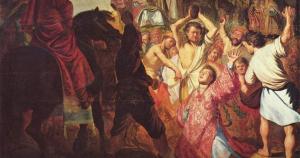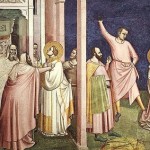 Acts 8:5-25
Acts 8:5-25
Was the stoning of St. Stephen a good or a bad thing?
Let me re-phrase that: was the Crucifixion of Jesus Christ a good or a bad thing?
The two events are one and the same, united as they are by the Holy Spirit and the unity that Christ promised between Himself and His Body.
But to answer the question, we might go back even further, to the Old Testament. Do you remember the story of Joseph and his brothers? His brothers, being jealous, wanted to kill him but settled for selling him to the Ishmaelites, who sold him to Egypt. Joseph became a servant and wound up in prison, but that’s not the end of the story. As a result of Joseph rising to be second in command of all of Egypt, Israel was saved.
Were the actions of Joseph’s brothers good or bad? Joseph himself, that interpreter of dreams and words, gives us the answer: “But as for you (Joseph’s brothers), you meant evil against me; but God meant it for good, in order to bring it about as it is this day, to save many people alive” (Genesis 50:20).
I’ll ask you again: was the stoning of Stephen a good or a bad thing? The Jews meant it for evil, but God meant it for good, to save many people alive. This the truth of Good Friday: that what men means for evil, God means for good, so that many might be saved. In his martyrdom, Stephen follows his Master, and God the Father uses it for good, as He did with His own Son. Why shouldn’t He? His Son is now with the Church, the Body of His Son.
And so we learn that as a result of the stoning of Stephen, Saul made havoc of the church, entering every house and dragging off men and women to prison. But those who were scattered went everywhere preaching the Word. How many times in church history has this happened, that God’s people are persecuted, and as a result the Word of God spreads? Countless times, from day of the Crucifixion until the present day.
In Chapter 8, the focus of Acts changes again to Philip, who is Greek, as was Stephen. The Enemy might kill a Stephen but God immediately raises up a Philip. Philip extends the reach of God’s Word and Kingdom even further, taking the gospel to Samaria. Step by step, inch by inch, slowly the Church in the book of Acts fulfills what Christ had commanded in Chapter 1: to begin in Jerusalem and move to Judea, Samaria, and finally to the ends of the earth. In the book of Acts, the good news of Jesus Christ moves with the Church and the love of God equally to those who were ethnic Jews, rich, men, and the “righteous” to those who are poor, women, and sinners. From these, Jesus Christ goes with His Church to the Hellenistic Jews and the proselytes, the circumcised non-ethnic Jews. He goes, here in Chapter 8, to the Samaritans as He loved to do while on earth and beyond them to the God-fearers, the uncircumcised devout Gentiles. In time, He comes even to the pagans, the uncircumcised Gentiles who still worshipped idols.
Once again, here in Chapter 8, Jesus Christ conquers by serving. He comes through Philip to bring the good news of life to the Samaritan dogs who didn’t deserve it. In the end, there was great joy in that city, since the multitudes with one accord heeded the things spoken by Philip (verses 6 and 8).
Was the stoning of Stephen a good thing? Not in itself, it could never be, but transformed by God it was, because the Father delights in taking the evil of men and turning it into good. Far greater than the miracle of turning water into wine is the miracle of turning evil into good, especially the greatest miracle of all: turning evil men into good men.
This is the miracle that we, together, have been asked to perform. To you and to me have been entrusted the words of life and the Bread of Life, and our Master is asking us to distribute to the hungry among us so that they might live. Each of us has a part in this sacred miracle, which often occurs in slow motion and which is often distributed among many Christians who have participated in it.
But there is another, more common, miracle that God delights to perform in our lives each and every day, and that is to take the evil things in our lives that cause suffering and transform them into good in our lives. I believe that He did this with Joseph and Israel, and I know He did it with Jesus Christ.
So why do I have such a difficult time believing and knowing His power in my life when He comes to offer the humble daily miracle of taking my suffering or weakness or losses and redeeming them? How many times are we not physically well, and how many times are we sick in our souls? How many times are we frustrated and discouraged, and how many relationships that we are in are in need of a physician?
As many times as any of these occur, that is how often God is willing to work His miracle. But, as in the Gospels, He works those miracles only in those who have faith, in those who turn from themselves and cry out to Him for help. Sometimes, this faith, seen in the prayer of pain, is tested, and He tarries. Sometimes Lazarus dies first before we see His glory and power. Sometimes, the miracle is performed in slow motion, and it is up to us to see His entire work in our lives.
Stephen, like His Lord, truly died. Devout men carried Stephen to his burial, and made great lamentation over him. But from that death came the joy of the Samaritans and many others.
As you take up your cross today, whatever size and shape He has ordained for you, embrace it, not as the evil that men do but as the miraculous good that the Father desires to work in your life today.
Prayer: Grant, O Lord, that, in all our sufferings here upon earth for the testimony of Your truth, we may steadfastly look up to heaven, and by faith behold the glory that shall be revealed. Being filled with the Holy Spirit, may we learn to love and bless our persecutors by the example of the first martyr St. Stephen, who prayed for his murderers to You. Grant that we may, through the Holy Spirit, be made Your faithful disciples and filled with faith and power, O blessed Jesus, who stands on the right hand of God to help all those who suffer for You, our only Mediator and Advocate. Amen.
Points for Meditation:
- Think of some times in your life when what was evil or painful was turned to good by the Lord.
- What evil or painful things in your life today have you not given to the Lord, that He might bring good from them?
Resolution: I resolve to find one way in my life in which God desires to redeem the evil that men do. When I find God at work in this evil, I resolve to give praise and thanks.
Rembrandt, Stoning of St. Stephen – U.S. Public Domain










